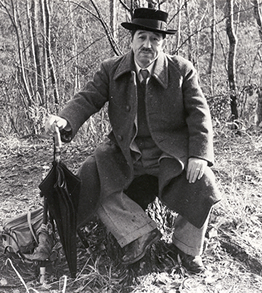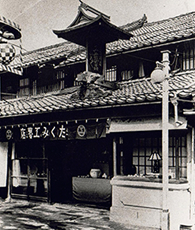Tottori (鳥取県), located in Western Japan, is the least populous prefecture in Japan. Long and narrow in the east–west direction, facing the Sea of Japan to the north and bordered by the rugged Chugoku Mountains (中国山地) to the south, Tottori is characterized by scarce flatland and difficult accessibility. Such geographical restrictions, however, gave birth to a unique culture of craft, as tools needed in everyday life and labor had to be sourced locally. Until today, many workshops, though small in scale, are still thriving and preserving skills passed down through generations.
During winter, Tottori is often blanketed by gray clouds carried by the north winds from the sea. The powerful sea winds give rise to sandy soil that offers ideal conditions for cultivating cotton. Also, heavy snow in the winter meant crafts like fabric production and papermaking sustained farmers’ livelihoods in the off season. Likewise, the southern mountains, including the revered Mount Daisen, provide abundant natural resources such as soil, wood, iron, and water, all vital for nurturing the culture of craftsmanship. Born from the harsh natural environment, the crafts of Tottori exude a rustic, sincere, and practical beauty.
Ceramics:
With over 30 kilns dotting across the prefecture, Tottori has a diverse, lively ceramic-making culture. The traditional workshops harvest local clay and glaze materials, as well as fire their pots with the traditional method of climbing kilns. Meanwhile, young artists also combine ancient methods with modern designs to create their distinct ceramics.
Inshu Washi
The history of Inshu washi (因州和紙) dates back to 1,300 years ago. The most well-known type is Gasenshi (画仙紙), a textured drawing paper perfect for calligraphy and ink painting, which notably boasts the biggest share in the domestic market. Each washi studio possesses a distinct hue, thickness, and texture that vary according to different workshops’ papermaking techniques such as tesuki (handmade), kikaizuki (machine-made), and rittaisuki (three-dimensional).
Hakushu Cotton
Cotton grows well on adequately-drained sandy soil along the coast of Western Tottori, often referred to as Hakushu. In the past, Hakushu Cotton was so integrated into local people’s lives that it was used by individual families to craft their own kimono and futon fabrics, with techniques like kasuri (絣) and weaving being handed down through generations.
Woodwork
Tottori is endowed with bountiful forests, which cover 74% of the prefecture’s land and once created a prosperous culture of woodworking and furniture making.
Bamboo Craft
Tottri is also abundant in bamboo resources. Bamboo crafts were traditionally designed for practical daily-use items such as baskets and Japanese umbrellas (wagasa, 和傘).
Metalwork
In Tottori, iron has been mined since ancient times and applied to craft metalwork such as knives and agricultural tools.
Folk Toys
Folk toys are crafted from various materials such as wood, paper, and straw and serve as a vehicle to reflect Tottori’s folklore, customs, and culture.
History

A crucial element of Tottori’s craft is mingei. The Mingei Movement that started about 100 years ago rediscovered the beauty of everyday items ordinary people use, still widely fascinating many people. Shoya Yoshida, a doctor in Tottori, was an important part of this movement. He visited Tottori’s craft studios that were on the verge of going out of business and helped them develop new mingei items that suited rapidly westernizing lifestyles at that time. He shared old mingei items around the world as models for artisans, taught them the proper attitude in producing crafts, ran a craft store himself to help them sell their items, elevated the quality of crafts, and established a more stable production system.
Shoya Yoshida’s influence is still firmly rooted in Tottori, with shops and galleries sustaining local artisans by dealing with their works. In addition, a flexible network among the community and artisans is present, such as local governments supporting young artisans moving in or launching a studio, as well as senior artisans supporting the younger generation.In Tottori, blessed with rich nature, artisans live at their own pace, producing their works through contemplation of their materials. We deliver you tools for everyday life that embody the concept of “yonobi” or the beauty of functionality born out of the local soil and rooted in its culture.
